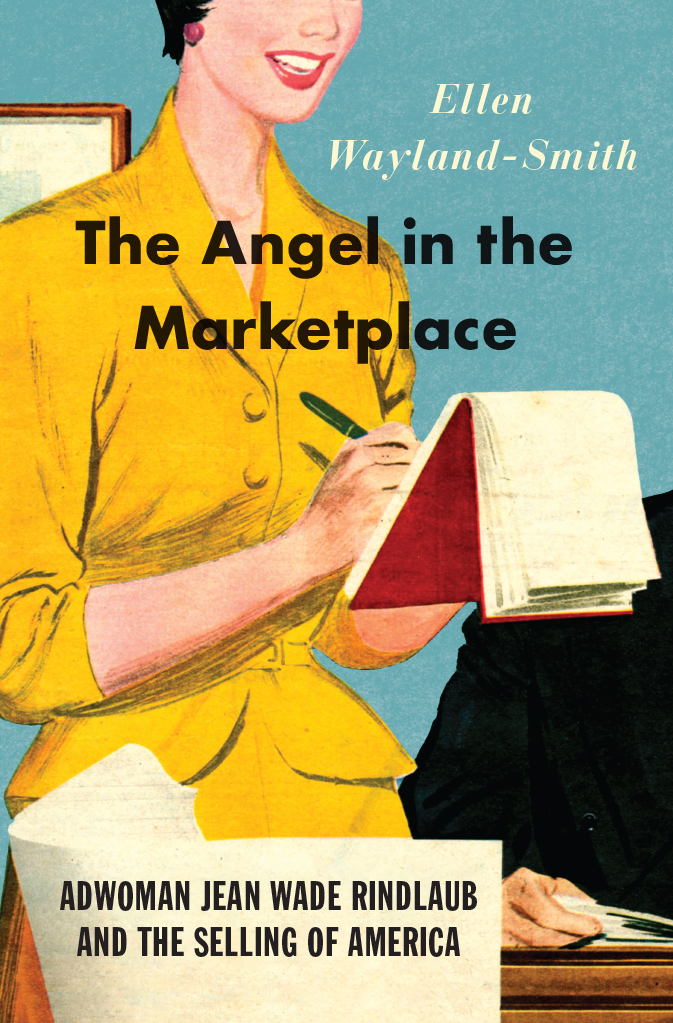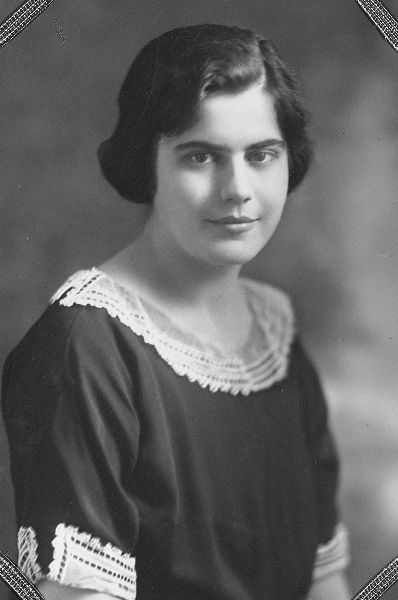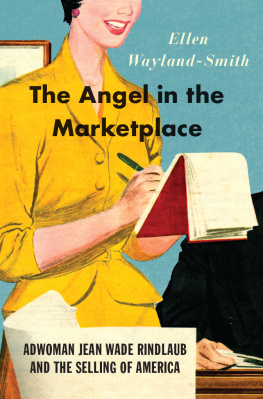
The Angel in the Marketplace
The Angel in the Marketplace
Adwoman Jean Wade Rindlaub and the Selling of America
Ellen Wayland-Smith
The University of Chicago Press
Chicago and London
The University of Chicago Press, Chicago 60637
The University of Chicago Press, Ltd., London
2020 by Ellen Wayland-Smith
All rights reserved. No part of this book may be used or reproduced in any manner whatsoever without written permission, except in the case of brief quotations in critical articles and reviews. For more information, contact the University of Chicago Press, 1427 E. 60th St., Chicago, IL 60637.
Published 2020
Printed in the United States of America
29 28 27 26 25 24 23 22 21 20 1 2 3 4 5
ISBN-13: 978-0-226-48632-1 (cloth)
ISBN-13: 978-0-226-48646-8 (e-book)
DOI: https://doi.org/10.7208/chicago/9780226486468.001.0001
Library of Congress Cataloging-in-Publication Data
Names: Wayland-Smith, Ellen, 1966 author.
Title: The angel in the marketplace : adwoman Jean Wade Rindlaub and the selling of America / Ellen Wayland-Smith.
Description: Chicago : University of Chicago Press, 2020. | Includes bibliographical references and index.
Identifiers: LCCN 2019053531 | ISBN 9780226486321 (cloth) | ISBN 9780226486468 (e-book)
Subjects: LCSH: Rindlaub, Jean Wade, 19041991. | BusinesswomenUnited StatesBiography. | Women in the advertising industryUnited StatesHistory20th century. | Advertising and womenUnited StatesHistory20th century. | AdvertisingUnited StatesHistory20th century.
Classification: LCC HF5810.R56 W39 2020 | DDC 659.1092 [B]dc23
LC record available at https://lccn.loc.gov/2019053531
 This paper meets the requirements of ANSI/NISO Z39.48-1992 (Permanence of Paper).
This paper meets the requirements of ANSI/NISO Z39.48-1992 (Permanence of Paper).
Contents
Odd Adman Out
Who Was Jean Wade Rindlaub?
In 1977, long before Mad Men, Patricia Tierney revealed the life of a sheep among the wolves of Madison Avenue in the 1960s.
All of these adwomen, real and fictional, take a tongue-in-cheek attitude toward the sexism they endure in the workplace, as well as the inanity of much of their industrys advertising to women. Alls fair in love and work, Tierney reasons, noting that the nascent feminist movement found few sympathizers among lady advertisers in the 60s and 70s: They have become such experts at using their wiles to get their ways, she muses, that theyre convinced theres no need to resort to the whip. Wells Lawrence made headlines when she sexed up the airline industry, painting Braniff Airways fleet candy colors and marketing its stewardesses as high-class strip-tease artists. And Maas played on sexist stereotypes, pragmatically accepting in her work for Dove dishwashing liquid and Maxim coffee that any advertising aimed at women would have to be sexist to succeed; once second-wave feminism hit, she just as pragmatically consigned those classic ads to the ashcan of history. I have always thought that our husband-pleasing strategy killed Maxim, she commented coolly. As feminism came in, husband-pleasing went out.
The feminist narrative of a Wells Lawrence or a Maas or an Olson is the archetypal one of a feisty girl deliciously beating men at their own game, a female Horatio Alger protagonist battling her way through the sexist workplace jungle to perch atop the advertising tree. They are all protoSheryl Sandbergs, leaning in to get their piece of the corporate piewhatever feminist ideals have to be sacrificed in the process.
But before them all was Jean Wade Rindlaub. Her approach was different from Tierneys or Wells Lawrences or Maass, and she certainly was no model for Peggy Olson. Yet she was, according to Tierney, one of the most successful ladies ever in advertising, who probably sold more soap, more soup, more cake mixes, and God knows what else than any other single human on earth. In 1920 at the age of sixteen, Jean took a job as secretary to the head of the Advertising Department at Armstrong Cork, a flooring manufacturer in her hometown of Lancaster, Pennsylvania; ten years later she was offered a copywriting position at the prestigious Madison Avenue firm of Batten Barton Durstine and Osborn. There, she rose through the ranks to become the companys first woman vice president in 1944, and the first woman named to the executive board in 1954. Along the way, she churned out award-winning, sales-generating advertisements for all things domestic: Oneida silverware, North Star blankets, Betty Crocker cake mix, Campbells soup, Chiquita bananas.
Yet Jean didnt resemble any of the female archetypes in the popularizing portraits of the era and the industry, her story shaped neither by sex nor the proverbial casting couch. Jean was resolutely unsexy. Tierney refers to her as one of the most physically unattractive females you would want to lay your eyes on, specifying that she was short, dumpy, and dark with outcroppings of hair where there was really no need for them. Even by her own assessment, Jean was not office eye candy. I was short and fat, Jean once admitted in an anonymous article in which she explained why she rushed to wed the first man who asked her, imperfect as he was: I hadnt enough money or social position or charm or beauty to make me a matrimonial catch. Any marriage was better than no marriage, in Jeans eyes, so she said yes quick!and urged other young women to do the same. Jean always rejected the label of career woman, describing her Madison Avenue post as simply a job she liked, and one that she never allowed to displace her primary job of wife and mother.

Figure 1. Portrait of Helen Jean Wade as a young woman, n.d.
Unlike Tierney or Maas, Jean had no ironic distance from her chosen profession. If I were twenty again, a forty-four-year old Jean announced in a 1948 speech to a womens advertising club, Id believe in advertising. This is one firm faith that has grown through the years. That is because, Jean claimed, advertising is a vital cog in the mechanism of the American business system on which our national moral and material well-being depended. Advertising has accepted its primary social responsibility of contributing to the effective mass production and economic distribution of the products of American industry,... [which] has done so much in the way of material things for the comfort and happiness of its people. Jean had unblinking faith in the American Christian corporate order and the strict domestic gender divisions on which it was built. Unlike the home-resistant and home-busting heroines of lady advertiser lore, Jean was the most fervent believer in the white picket fence dream. She even once called her suburban homestead a little piece of heaven.
Jean believed that the humble American home of soup and soap and cakes not only was the moral Christian center of American life; it also depended on another, larger structure: free-market capitalism. The interdependence of the two structuresthe feminine home as safe haven from the competitive masculine markethad been axiomatic in American culture from the onset of industrialization in the nineteenth century. During the Victorian era, the dutiful wife and mother was esteemed an angel in the house, exerting her virtuous control over all under her roof. With the growth of consumer culture in the 1910s and 20s, however, women were increasingly invested with a households purchasing power and expected to apply their angelic influence not just in the home but in the marketplace as well. The banker V. Everitt Macy in 1917 called free-market capitalism the industrial and commercial structure which is the indispensable shelter of us all, and that Americans were duty-bound to protect. Jean concurred: she believed it was her God-appointed work to keep both these homes safe.
Next page












 This paper meets the requirements of ANSI/NISO Z39.48-1992 (Permanence of Paper).
This paper meets the requirements of ANSI/NISO Z39.48-1992 (Permanence of Paper).